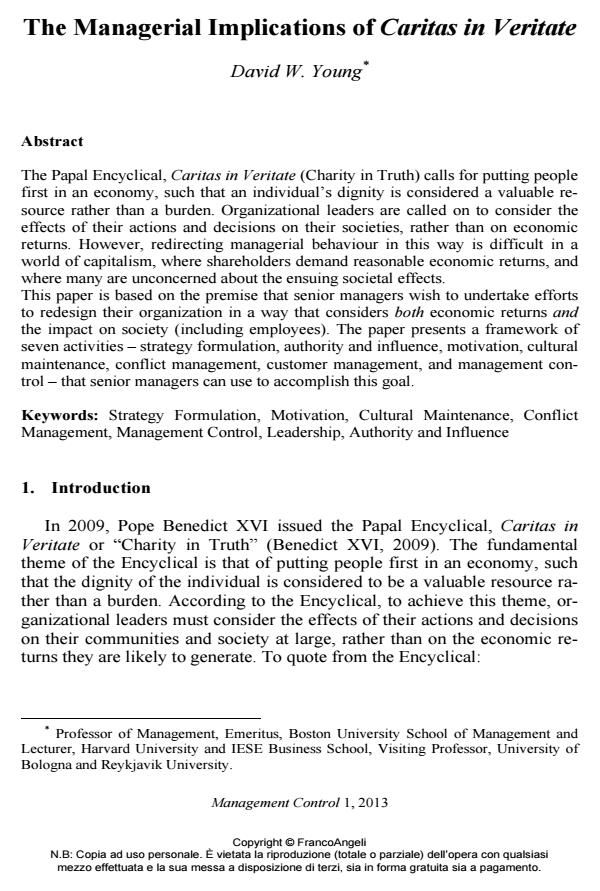The Managerial Implications of Caritas in Veritate
Journal title MANAGEMENT CONTROL
Author/s David W. Young
Publishing Year 2013 Issue 2013/1
Language Italian Pages 19 P. 7-25 File size 579 KB
DOI 10.3280/MACO2013-001002
DOI is like a bar code for intellectual property: to have more infomation
click here
Below, you can see the article first page
If you want to buy this article in PDF format, you can do it, following the instructions to buy download credits

FrancoAngeli is member of Publishers International Linking Association, Inc (PILA), a not-for-profit association which run the CrossRef service enabling links to and from online scholarly content.
The Papal Encyclical, Caritas in Veritate (Charity in Truth) calls for putting people first in an economy, such that an individual’s dignity is considered a valuable resource rather than a burden. Organizational leaders are called on to consider the effects of their actions and decisions on their societies, rather than on economic returns. However, redirecting managerial behaviour in this way is difficult in a world of capitalism, where shareholders demand reasonable economic returns, and where many are unconcerned about the ensuing societal effects. This paper is based on the premise that senior managers wish to undertake efforts to redesign their organization in a way that considers both economic returns and the impact on society (including employees). The paper presents a framework of seven activities - strategy formulation, authority and influence, motivation, cultural maintenance, conflict management, customer management, and management control - that senior managers can use to accomplish this goal.
Keywords: Strategy Formulation, Motivation, Cultural Maintenance, Conflict Management, Management Control, Leadership, Authority and Influence
- Anthony, Robert N., and V.J. Govindarajan (2007), Management Control Systems, 12th edition, Burr Ridge, Ill., Irwin-McGraw Hill
- Barnard, Chester (1938), The Functions of the Executive, Cambridge, Harvard University Press.
- Benedict XVI (2009), Caritas in Veritate, Papal Encyclical, 29 June 2009. For a full text, go to: http://www.vatican.va/holy_father/benedict_xvi/encyclicals/documents/hf_benxvi_ enc_20090 629_caritas-in-veritate_en.html
- Epstein, Marc J. (2004), The Identification, Measurement, and Reporting of Corporate Social Impacts: Past, Present, and Future, Advances in Environmental Accounting and Management, Advances in Environmental Accounting and Management, Volume 2, 1– 29, Elsevier Ltd. DOI: 10.1016/S1479-3598(03)02001-6
- Hamel, Gary (with Bill Breen) (2007), Aiming for an Evolutionary Advantage: Management Innovation in Action, Boston, Harvard Business School Publishing, Chapter 6 (“Google”).
- Hammer, Michael, and James Champy (1993), Reengineering the Corporation, New York, Harper Collins.
- Institute for Policy Studies (2006, 2007, 2008), Executive Excess Reports
- Kaplan, Robert S, and David P. Norton (1996), The Balanced Scorecard, Boston, Harvard Business School Press
- Kotter, John P. (1977), Power, Dependence, and Effective Management, Harvard Business Review, July-August
- Lawrence, P.R., and J. W. Lorsch (1967), Organization and Environment: Managing Differentiation and Integration, Boston, Division of Research, Graduate School of Business Administration, Harvard University.
- Leonard, Dorothy, and Walter Swap (1999), When Sparks Fly: Igniting Creativity in Groups, Boston, Harvard Business School Press.
- Levitt, Theodore (1972), A Production Line Approach to Service, Harvard Business Review, July-August
- Nelson, Bob (1997), 1001 Ways to Energize Employees, Workman Publishing
- Peters, Thomas J. and Robert H. Waterman, Jr. (1982), In Search of Excellence: Lessons from America’s Best-Run Companies, New York, Harper and Row
- Pfeffer, J. (1998), The Human Equation: Building Profits by Putting People First, Boston, Massachusetts: Harvard Business School Press
- Porter, Michael (1996), What is Strategy, Harvard Business Review, November- December
- Schein, Edgar H., (2010), Organizational Culture and Leadership, 4th edition, San Francisco, Jossey Bass Publishers.
- Simon, Herbert A. (1945), Administrative Behavior, New York, The Free Press
- Wetlaufer, Suzy (2000), Common Sense and Conflict: An Interview with Disney’s Michael Eisner, Harvard Business Review, January-February
- Welch, Jack (with John A. Byrne) (2001), Jack: Straight from the Gut, New York, Warner Business Books
- Young, David W. (2000), Managing Organizational Culture, Business Horizons, September- October
- Young, David W. (2012), Management Control in Nonprofit Organizations, 9th edition, Cambridge, Massachusetts, The Crimson Press.
- Strategic performance management systems in Italian banks. A research note Francesca Francioli, in MANAGEMENT CONTROL 2/2018 pp.155
DOI: 10.3280/MACO2018-002008 - Quale metodologia di ricerca sulle tematiche di Management Control? Luciano Marchi, in MANAGEMENT CONTROL 2/2018 pp.5
DOI: 10.3280/MACO2018-002001 - La comunicazione al mercato delle performance economico-finanziarie: il ruolo del controllo di gestione Luciano Marchi, Sara Trucco, in MANAGEMENT CONTROL 3/2017 pp.55
DOI: 10.3280/MACO2017-003005
David W. Young, The Managerial Implications of Caritas in Veritate in "MANAGEMENT CONTROL" 1/2013, pp 7-25, DOI: 10.3280/MACO2013-001002